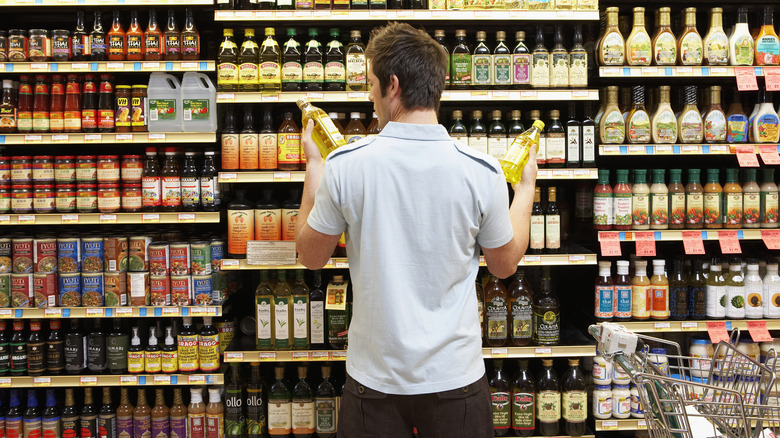Americans Are Reportedly Buying Less Of These Foods To Save Money
Inflation-weary consumers are cutting back on their grocery purchases. Shoppers have been employing an arsenal of money-saving tactics like switching to generic brands or shopping at discount stores. But, as inflation drags on, some items are getting 86'ed from grocery lists altogether. Data research platform NielsenNIQ found that the top three foods Americans can't justify shelling out for anymore are frozen meals, fruit juice, and soup, reports Bloomberg. Folks have been scrimping on these categories since at least April.
In Q1 2023, the price of frozen foods rose by 17% in the U.S. and the U.K., the highest price uptick since Q1 2022. (Frozen meals got even more expensive in France and Germany with a 19% increase.) Fluctuating periods of extreme rainfall and drought made for a lousy growing season in Florida last year, and the orange crop suffered devastatingly — a 61% drop from last year's yield. (So long, morning glass of OJ.) As of last February, it wasn't uncommon for orange juice prices to hit $10 per gallon; even juice concentrate hit $6.27 a gallon.
Another unseen factor contributing to fruit juice price hikes is higher energy costs. Manufacturing apple juice is an energy-intensive process, from crushing to washing, juice extraction, storage, sterilization, and cooling. Higher energy costs mean higher production costs for producers, and apple juice imported from China got 10.3% more expensive month-on-month in November 2022.
Frozen meals, fruit juice, and soup aren't making the cut
Conagra Brands CEO Sean Connolly doesn't suspect that "people are eating less," via Bloomberg, but rather that the cutbacks are a short-lived emergency strategy for coping with high food prices. NIQ's Carman Allison hypothesizes that folks are turning to their pantry and freezer inventories, and otherwise "spending more but buying less." This certainly seems to be the case for Campbell's Soup, as the stock fell by a whopping 18% in 2023. Unsustainable price increases drove shoppers to satisfy their soup needs elsewhere (i.e. generic brands) if not ax soup from the list altogether. Grocery items as a whole have seen a 2% drop in total sales this year, while total food prices went up 7% in Q1 2023 compared to the same time in 2022, via Store Brands.
Connolly theorizes that Americans are turning their limited funds toward other ventures. "The consumer is very creative and very crafty in terms of finding ways to stretch their budget," he tells Bloomberg. "One of the ways they make that happen is they just cut back temporarily on the stuff that they buy in order to be able to fund other expenses. That's what we believe." Whether that means paying rent or having enough left over for dinner out on the weekend, in the face of a pretty serious global recession, U.S. consumers are overdue for a little fun — even if it means cutting back on weekly groceries to have it.

